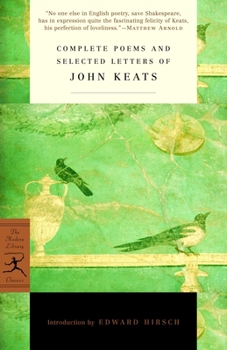Complete Poems and Selected Letters of John Keats
Select Format
Select Condition 
Book Overview
'I think I shall be among the English Poets after my death, ' John Keats soberly prophesied in 1818 as he started writing the blankverse epic Hyperion. Today he endures as the archetypal Romantic... This description may be from another edition of this product.
Format:Paperback
Language:English
ISBN:0375756698
ISBN13:9780375756696
Release Date:February 2001
Publisher:Modern Library
Length:640 Pages
Weight:1.75 lbs.
Dimensions:1.4" x 5.2" x 8.0"
Customer Reviews
2 ratings
Incredible
Published by Thriftbooks.com User , 16 years ago
Pertaining to Keats himself, I could scarcely lavish enough praise upon his poetry. I must confess an extreme partiality to the High Romantics (Blake, Wordsworth, Keats, Shelley, Coleridge, etc.), and, among them, Keats vies with Wordsworth for the best verse. Many of his poems are quite famous--if you have studied only a little poetry, you likely have passing familiarity with his great odes (especially the sublime "To Autumn," "To a Nightingale," and the wonderful, deep "On a Grecian Urn") or with his strangely dark "La Belle Dame sans Merci." If you have studied poetry and none of these poems even rings a bell, well... you have been missing out! Take this brief snippet of a stanza from his "Ode on a Grecian Urn": "... Thou, silent form, dost tease us out of thought As doth eternity: Cold Pastoral! When old age shall this generation waste, Thou shalt remain, in midst of other woe Than ours, a friend to man, to whom thou say'st `Beauty is truth, truth beauty, --that is all Ye know on earth, and all ye need to know.'" The odes are not his only great poems, of course; I daresay almost every poem in this volume is invaluable. They are, however, his most famous lyrics, and for good reason! Some, critic/poet T.S. Eliot, for example, detest the Romantics**. Eliotian criticism for the first half of last century dismissed them frequently, and tried to deny their lyrical power and the influence of Romanticism on all poetry thereafter. I will admit that among the Romantics, there are some who are often weak: Lord Byron, for example, ranges from marvelous to quite tawdry, and I can't say I'm an overly enthusiastic fan of Shelley. Keats, however, who lived only to be twenty-five, suffers none of the faults of his more fortunate contemporaries. He is deeper than any save Blake, and his only rival in lyrical beauty (an intentionally vague term...) I have yet read is Wordsworth. Anyone who loves poems, who has a reverence for life and a wonder for its mysteries and sorrows, anyone who is enthralled with the power of a well-turned phrase or well-craft lyric; anyone of such a nature with fall in love with John Keats. [**: I must note, upon reading the hidden appendix of criticism on Keats pointed out by the wonderful review above, that Eliot is not critical of Keats. Among the Romantics, he seems to regard Keats fairly highly; I know for a fact, however, that this is not the case with most other Romantic poets]
Excellent For College Study or Independent Reading
Published by Thriftbooks.com User , 22 years ago
In his short life John Keats created some of the finest poetry in the English language. I have read his shorter poems and odes many times, not for study, but simply for enjoyment. I am not a Keats expert, but I can now easily recognize quotations from Keat's odes, sonnets, and other poems. I especially like "The Eve of St. Agnes", a story of romance and danger in a medieval setting that illustrates Keats' remarkable command of language.Keats is not difficult, but footnotes help with archaic words and references to more obscure Greek mythology. I prefer to read Keats unaided, then read the footnotes (best if tucked away in an appendix), and then return and read the poem again. For longer poems I jump to footnotes more quickly.Initially, the inexpensive Dover edition "Lyric Poems", was exactly what I needed. Later, as I tackled longer poetry like "Endymion", I migrated to more complete collections with commentary and footnotes.Keats" works are widely available in hardcover and paperback. Which collection is best for college study or independent reading? I have two favorites, one by Penguin Classics and the other by Modern Library. Both are available in softcovers.The first is "The Complete Poems" by Penguin Classics, edited by John Bernard and a standard choice for college classes. I have the second edition, 1977. Barnard's extensive footnotes and commentary are quite good and offset his somewhat brief introduction. Additionally, the appendix discusses textual variations in Keats' manuscripts and has a useful guide to Greek mythology names. The third edition, 1988, adds 20 pages of selected letters, Keats' notes on Milton's Paradise Lost, and his notes on a Shakespearean actor.The second choice (my favorite) is the newly published "Complete Poems and Selected Letters of John Keats", Modern Library 2001 edition (not the earlier 1994 hardcover version). Apparently as a direct challenge to Penguin Classics, this edition offers a longer introduction (22 pages) by Edward Hirsch and excellent footnotes (not too many, nor too few) by John Pollock. Also, as the title implies, it has selected letters by Keats, some 25 pages in total. Somewhat hidden in the appendix is commentary by six well-known literary critics such as T. S. Eliot, Mathew Arnold, and Keats' biographer Walter Jackson Bate. Lastly, the font is larger and more crisp in the Modern Library version (but is still quite acceptable in the Penguin edition).Overall, I prefer Hirsch to Barnard, but both are good choices. Both are 5-stars.





